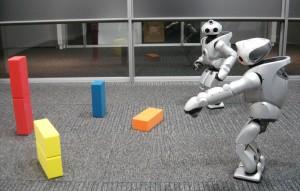Luc Steels and Terje Lohndal: Can Machines Be Creative Enough To Invent Their Own Language?
Hovedinnhold
This Horizons lecture is part of the University of Bergen Centenial Celebration of the life and work of Alan Turing (1912-1954). During his relatively brief life, Turing made a unique impact on the history of computing, computer science, artificial intelligence, developmental biology, and the mathematical theory of computability. Read more about the Turing Celebration at the University of Bergen.
Luc Steels is an ICREA research professor at the Institut de Biologia Evolutiva (CSIC-UPF) in Barcelona and director of the Sony Computer Science Laboratory in Paris.
About the lecture Steel says "For the past decade, I have been doing experiments with my team trying to see in how far we could program a group of robots to autonomously create and learn from each other a symbolic communication system with similar properties as we find in human languages. We have managed to do some breakthrough experiments showing the emergence of lexicons for colour, space, and actions with robots playing language games and have made significant headway on the question of the emergence of grammar. This talk shows through some stunning video clips of what we have been able to achieve and discusses what this tells us about the nature of our own intelligence, the mechanisms underlying cultural evolution and the future of artificial intelligence." Read more about Steels research.
Steels lecture is followed by debate with Terje Lohndal, an associate professor in linguistics at NTNU. Lohndal is a promising researcher referred to, by Morgenbladet, as “the Mozart of linguistics” .
Read more in a chronicle (in Norwegian only) by professor Jan Arne Telle, University of Bergen.
The event starts with a snack and refreshments in advance of the lecture that starts at 18.15.
The lecture is open to all. Welcome!
Interested in upcoming Horizon lectures? Send an e-mail to Kristin Bakken to receive information by e-mail in advance of lectures.
